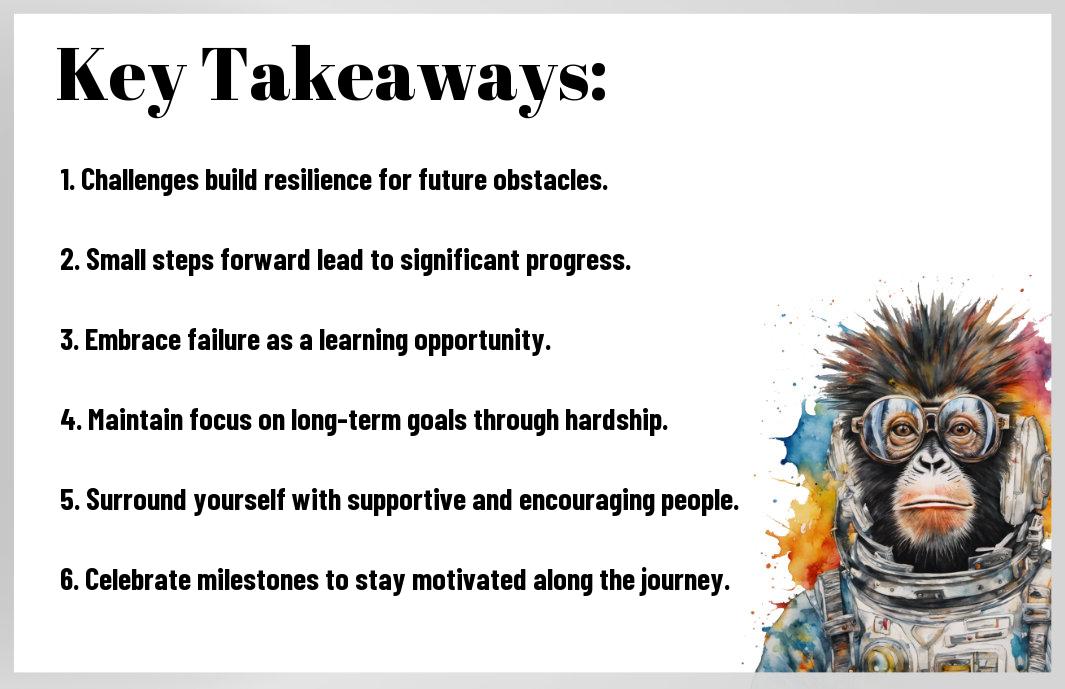
Newsletter Subscribe
Enter your email address below and subscribe to our newsletter

Enter your email address below and subscribe to our newsletter

Just when I think I can’t push any further, I discover the true power of perseverance. Life often presents challenges that test our limits and resolve. It’s in these moments that you must dig deep and keep moving forward, despite the odds. By embracing the struggle and not shying away from it, I find an inner strength that propels me towards my goals. For some inspiration, check out Motivation Monday: 5 Great Quotes About Perseverance that resonate with this journey.

To navigate the challenges life throws your way, understanding perseverance is a key component. It’s an unwavering commitment to keep pushing forward despite obstacles and setbacks. By cultivating this mindset, you can develop resilience, which is necessary for personal growth and achievement in any area of your life.
Any discussion about perseverance must highlight its significance in achieving success. It refers to the steadfastness in doing something despite difficulty or delay in achieving success. Embracing perseverance not only helps you overcome difficulties, but it also builds confidence and fosters a sense of accomplishment in your journey.
Behind every great achievement lies a story of perseverance. Many influential figures faced overwhelming challenges that could have easily led them to quit, but they chose to continue instead. Whether it was Thomas Edison failing thousands of times before inventing the light bulb or Winston Churchill’s relentless pursuit of victory during World War II, their journeys exemplify how determination and grit can lead to remarkable successes.
This is evident when we analyze the stories of pioneers like Marie Curie, who faced gender biases and health risks while advancing the field of radioactivity, or Nelson Mandela, who spent 27 years in prison yet remained committed to his vision of equality and justice. These narratives of perseverance shine light on the importance of holding steadfast in the face of adversity. They teach you that persistence can transform dreams into reality, no matter how insurmountable the odds may seem.
One of the key elements in achieving success amidst challenges is understanding the psychology of perseverance. It involves recognizing the mental frameworks that can either support or hinder your quest to keep moving forward. I believe that grasping these psychological concepts will not only bolster your determination but also refine your approach to obstacles, enabling you to tackle life’s demands more effectively.
Before you initiate on any journey, it’s crucial to establish the right mindset. Your perception of challenges directly influences your ability to persevere. When I adopt a growth mindset, I see difficulties as opportunities for improvement rather than roadblocks. This shift in thinking empowers you to embrace challenges and equips you with the resilience needed to push through tough times.
Below the surface of perseverance lies the common enemy: self-doubt. It can creep in unexpectedly, undermining your confidence and determination. I’ve faced moments when inner voices suggested that I’m not good enough, but overcoming these thoughts is crucial for progress. You must learn to challenge these negative beliefs, as doing so is vital to maintaining focus on your goals and aspirations.
Even the most accomplished individuals encounter self-doubt, but the key lies in how we address it. I urge you to confront this inner critic head-on by replacing negative self-talk with affirmations of your strengths and past successes. View setbacks not as failures, but as learning experiences that propel you toward growth. By actively countering self-doubt, I’ve discovered a newfound confidence that fuels my perseverance, allowing me to keep pushing forward, regardless of the challenges I face.

Unlike many believe, developing perseverance is not solely about willpower; it involves implementing effective strategies. I find that the most important lesson I’ve learned about perseverance centers around making deliberate choices to keep pushing forward, especially during tough times.
Any journey toward perseverance starts with setting realistic goals. I believe it’s imperative to break down your larger objectives into smaller, manageable tasks. This way, you can celebrate small victories that will fuel your motivation and drive, ultimately leading you to your larger aspirations.
To develop perseverance effectively, you must build a robust support network around you. Surrounding myself with positive and encouraging individuals makes a considerable difference when facing challenges.
Further, having a strong support network not only provides you with accountability but also offers emotional reinforcement during tough times. Engaging with others who share similar goals can foster a sense of community. It’s important to identify those who uplift you and share your vision—this connection is vital for maintaining momentum and motivation. By surrounding myself with supportive friends, mentors, or peers, I can navigate difficulties with greater ease and resilience.

Despite the challenges that life throws our way, resilience allows us to bounce back and maintain our momentum. When faced with obstacles, it’s this inner strength that fuels our perseverance, enabling us to push through hardships and emerge stronger. I’ve learned that resilience isn’t just about endurance; it’s about adapting and growing through tough times, keeping our goals in sight no matter how daunting the journey may seem.
Perseverance requires the ability to bounce back after experiencing setbacks. Life is often unpredictable, and challenges can derail our progress. However, it is during these moments of struggle that we can develop a deeper sense of determination. I view setbacks as opportunities to reflect and recommit to my goals, reinforcing my commitment to keep moving forward.
About failure, it’s often seen as a negative experience, but it can be a valuable teacher. When you encounter setbacks, I encourage you to analyze what went wrong and identify ways to improve. Through this process, you can develop strategies that enhance your ability to persevere and face future challenges with greater confidence.
Understanding the significance of learning from failure can transform your perspective on setbacks. Rather than viewing them as obstacles, you can see them as stepping stones to success. Each failure presents an opportunity to analyze actions, reflect on decisions, and grow. By embracing this mindset, you not only build your resilience but also strengthen your ability to persevere through tough times. Failure can teach you valuable lessons that prepare you for future challenges, ultimately enhancing your journey toward achieving your goals.
Many researchers have found that the link between perseverance and success is profound. Individuals who persist in the face of adversity develop resilience, adaptability, and strong problem-solving skills, which lead to achieving their goals. This determination often results in greater opportunities and accomplishments than those who give up easily. It’s not just about reaching the finish line; it’s about the growth and skills acquired during the journey.
Perseverance can be observed through numerous successful individuals:
With persistence, individuals not only reach short-term goals but also cultivate long-lasting habits and skills that benefit them throughout their lives. The act of pushing through challenges fosters confidence, self-discipline, and a growth mindset. When you face obstacles and continually strive to overcome them, you build a solid foundation for future success, allowing you to tackle even larger challenges in your personal and professional life.
Understanding the long-term benefits of perseverance is necessary for your growth. It teaches you to embrace failures as necessary steps towards success, creating a mindset that views difficulties as opportunities for learning and improvement. This perspective can significantly bolster your resilience and adaptability. The skills and attributes that you develop through perseverance, such as strong willpower and adaptability, make you less vulnerable to challenges and help you find creative solutions in turbulent times.
Not every day will be easy, and challenges are inevitable. However, by embracing perseverance as a daily practice, you can foster resolve. I encourage you to approach each day with a mindset geared toward growth, where obstacles become opportunities to develop resilience. Integrating small yet meaningful actions can keep your spirit unwavering, even during trying times.
By setting consistent habits and routines, you create a framework that supports perseverance. I find that starting my day with a focused intention, whether through mindfulness or planning, lays the groundwork for tackling challenges head-on. Incorporating regular self-reflection also allows me to adjust my strategies and maintain my motivation.
The ability to foster perseverance in those around you is a powerful tool for collective growth. I have observed that by providing support and sharing my own experiences, I can inspire others to stick with their goals, even amidst difficulties. Creating an environment where setbacks are seen as stepping stones encourages everyone to push through.
To truly encourage a perseverant mindset in others, I suggest sharing stories that highlight both struggle and triumph. Engaging in open conversations about challenges lets individuals know they’re not alone in their journeys. Additionally, recognizing and celebrating their small victories strengthens their belief in their abilities. Always offer support and encouragement, reminding them that perseverance leads to growth and achievement. By fostering this environment, you not only enhance their resolve but also build a community devoted to resilience and success.
From above, I’ve found that perseverance is vital when facing challenges. You will encounter difficulties, but it’s important to keep pushing forward. I encourage you to embrace setbacks as learning opportunities and maintain a positive mindset. You have the strength to overcome obstacles, and each small step taken can lead you closer to your goals. Trust in your ability to persist, and you’ll discover that resilience can make all the difference in achieving success.
A: Perseverance refers to the ability to persist in a course of action, purpose, or belief, despite facing difficulties or obstacles. It embodies the spirit of resilience and determination to keep moving forward, regardless of challenges that may arise along the way.
A: Perseverance is crucial because achieving significant goals often involves overcoming setbacks and facing failures. It helps individuals stay committed to their objectives and encourages continuous improvement, allowing them to build skills and experience necessary for success over time.
A: Developing perseverance can involve setting realistic goals, breaking tasks into smaller, manageable parts, and celebrating small victories along the way. Additionally, surrounding oneself with supportive individuals and maintaining a positive mindset can foster a more resilient attitude toward challenges.
A: Common challenges include self-doubt, fear of failure, external criticism, and unexpected circumstances or changes in one’s environment. These factors can test an individual’s commitment and resolve, making it more difficult to continue striving toward goals.
A: While perseverance is vital for achieving goals, it is important to balance determination with self-care. Overexertion without taking breaks or recognizing limits can lead to burnout. It is crucial to pace oneself and allow time for rest and rejuvenation to maintain sustainable perseverance.
A: Perseverance can have a positive impact on mental health by fostering a sense of accomplishment and self-worth when challenges are overcome. However, if perseverance turns into stubbornness or refusal to adapt, it can lead to increased stress and frustration. Striking a healthy balance is key.
A: Yes, many renowned figures exemplify perseverance. For instance, Thomas Edison faced numerous failures before inventing the light bulb, and J.K. Rowling endured many rejections before publishing the Harry Potter series. Their stories inspire others to push through difficulties and pursue their dreams with tenacity.